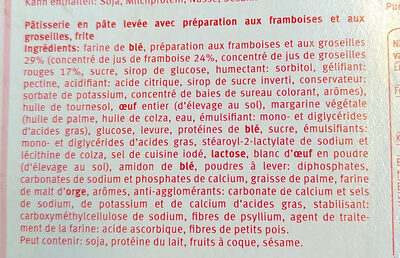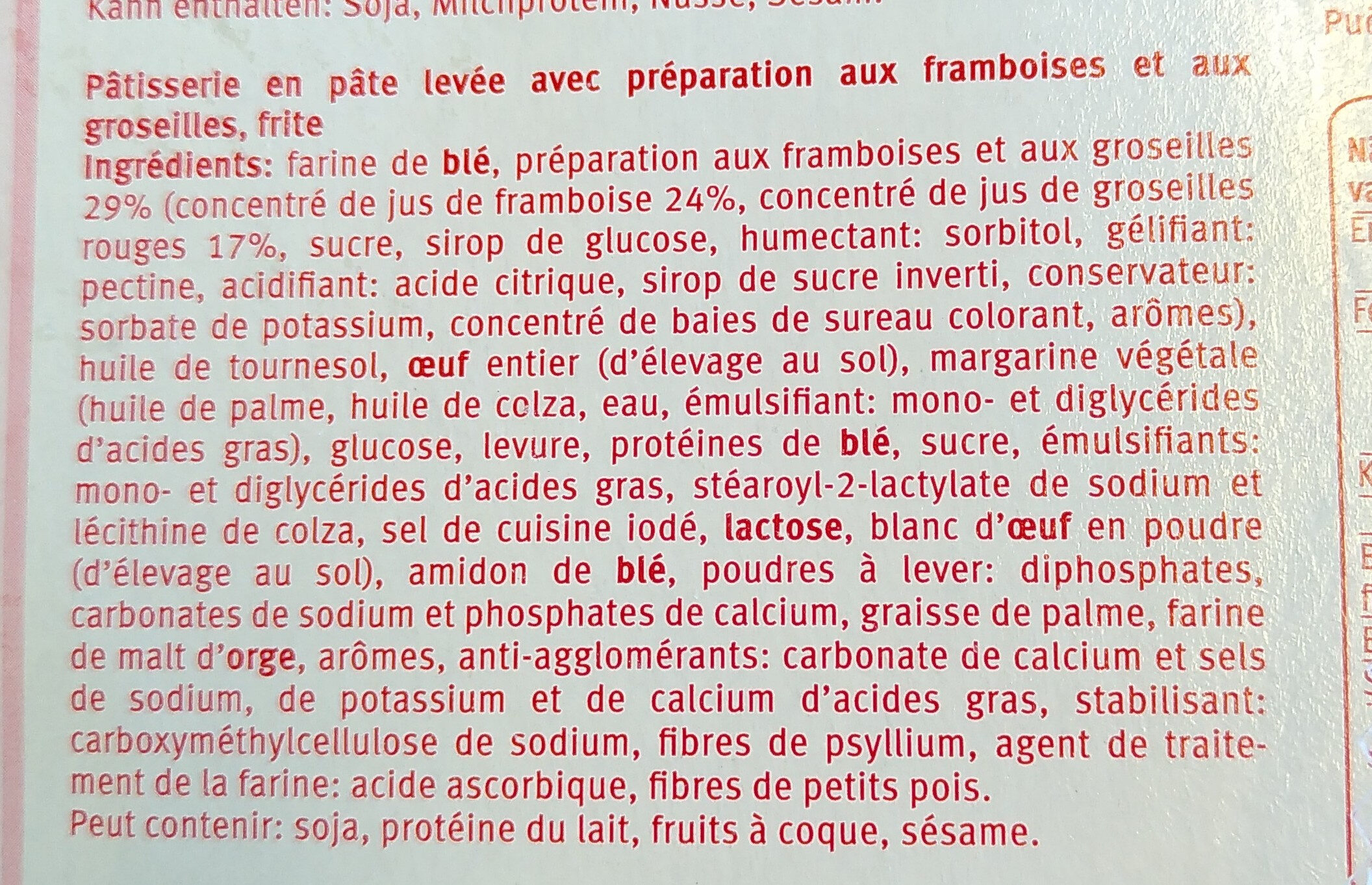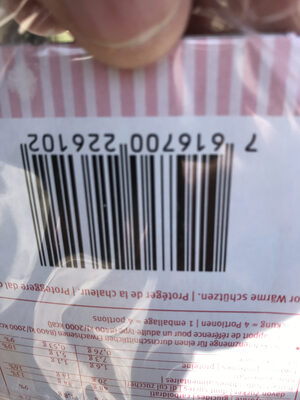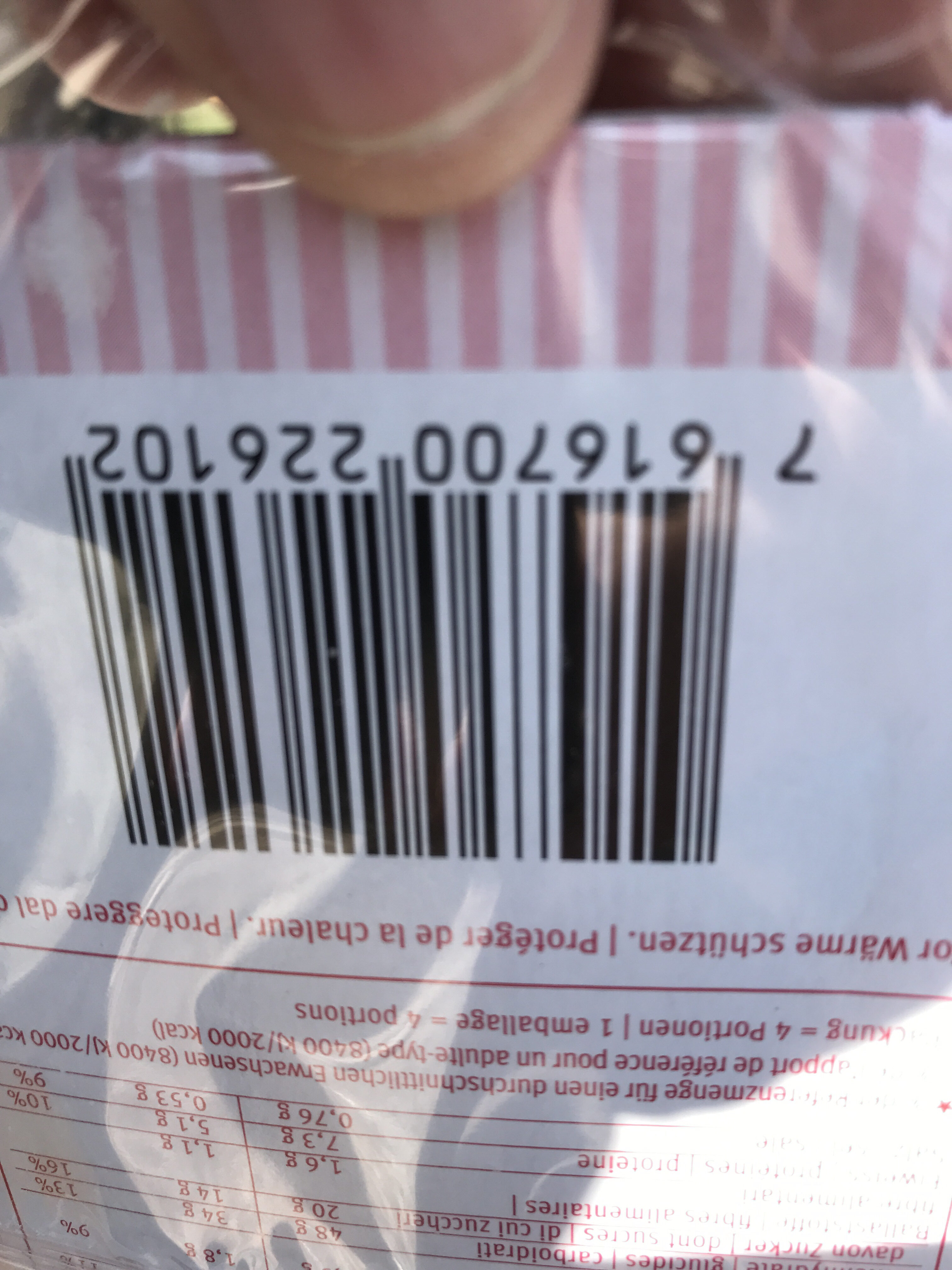Help us make food transparency the norm!
As a non-profit organization, we depend on your donations to continue informing consumers around the world about what they eat.
The food revolution starts with you!
Boules de Berlin - Migros - 280g
Boules de Berlin - Migros - 280g
This product page is not complete. You can help to complete it by editing it and adding more data from the photos we have, or by taking more photos using the app for Android or iPhone/iPad. Thank you!
×
Barcode: 7616700226102 (EAN / EAN-13)
Quantity: 280g
Brands: Migros
Categories: Snacks, Sweet snacks, Biscuits and cakes
Manufacturing or processing places: Suisse
Stores: Migros
Countries where sold: Switzerland
Matching with your preferences
Health
Ingredients
-
56 ingredients
: Farine de blé, préparation aux framboises et aux groseilles 29% (concentré de jus de framboise 24%, concentré de jus de groseilles rouges 17%, sucre, sirop de glucose, humectant: sorbitol, gélifiant: pectine, acidifiant: acide citrique, sirop de sucre inverti, conservateur: sorbate de potassium, concentré de baies de sureau colorant, arômes), huile de tournesol, œuf entier (d'élevage au sol), margarine végétale (huile de palme, huile de colza, eau, émulsifiant: mono - et diglycérides d'acides gras), glucose, levure, protéines de blé, sucre, émulsifiants: mono - et diglycérides d'acides gras, stéaroyl-2-lactylate de sodium et lécithine de colza, sel de cuisine iodé, lactose, blanc d'œuf en poudre (d'élevage au sol), amidon de blé, poudres à lever: diphosphates, carbonates de sodium et phosphates de calcium, graisse de palme, farine de malt d'orge, arômes, anti-agglomérants: carbonate de calcium et sels de sodium, de potassium et de calcium d'acides gras, stabilisant: carboxyméthylcellulose de sodium, fibres de psyllium, agent de traite - ment de la farine: acide ascorbique, fibres de petits pois.Allergens: Gluten, MilkTraces: Milk, Nuts, Sesame seeds, Soybeans
Food processing
-
Ultra processed foods
Elements that indicate the product is in the 4 - Ultra processed food and drink products group:
- Additive: E170 - Calcium carbonates
- Additive: E420 - Sorbitol
- Additive: E440 - Pectins
- Additive: E450 - Diphosphates
- Additive: E466 - Sodium carboxy methyl cellulose
- Additive: E471 - Mono- and diglycerides of fatty acids
- Additive: E481 - Sodium stearoyl-2-lactylate
- Ingredient: Emulsifier
- Ingredient: Flavouring
- Ingredient: Gelling agent
- Ingredient: Glucose
- Ingredient: Glucose syrup
- Ingredient: Humectant
- Ingredient: Invert sugar
- Ingredient: Lactose
Food products are classified into 4 groups according to their degree of processing:
- Unprocessed or minimally processed foods
- Processed culinary ingredients
- Processed foods
- Ultra processed foods
The determination of the group is based on the category of the product and on the ingredients it contains.
Additives
-
E170 - Calcium carbonates
Calcium carbonate: Calcium carbonate is a chemical compound with the formula CaCO3. It is a common substance found in rocks as the minerals calcite and aragonite -most notably as limestone, which is a type of sedimentary rock consisting mainly of calcite- and is the main component of pearls and the shells of marine organisms, snails, and eggs. Calcium carbonate is the active ingredient in agricultural lime and is created when calcium ions in hard water react with carbonate ions to create limescale. It is medicinally used as a calcium supplement or as an antacid, but excessive consumption can be hazardous.Source: Wikipedia
-
E202 - Potassium sorbate
Potassium sorbate (E202) is a synthetic food preservative commonly used to extend the shelf life of various food products.
It works by inhibiting the growth of molds, yeast, and some bacteria, preventing spoilage. When added to foods, it helps maintain their freshness and quality.
Some studies have shown that when combined with nitrites, potassium sorbate have genotoxic activity in vitro. However, potassium sorbate is generally recognized as safe (GRAS) by regulatory authorities.
-
E330 - Citric acid
Citric acid is a natural organic acid found in citrus fruits such as lemons, oranges, and limes.
It is widely used in the food industry as a flavor enhancer, acidulant, and preservative due to its tart and refreshing taste.
Citric acid is safe for consumption when used in moderation and is considered a generally recognized as safe (GRAS) food additive by regulatory agencies worldwide.
-
E341 - Calcium phosphates
Calcium phosphate: Calcium phosphate is a family of materials and minerals containing calcium ions -Ca2+- together with inorganic phosphate anions. Some so-called calcium phosphates contain oxide and hydroxide as well. They are white solids of nutritious value.Source: Wikipedia
-
E420 - Sorbitol
Sorbitol: Sorbitol --, less commonly known as glucitol --, is a sugar alcohol with a sweet taste which the human body metabolizes slowly. It can be obtained by reduction of glucose, which changes the aldehyde group to a hydroxyl group. Most sorbitol is made from corn syrup, but it is also found in nature, for example in apples, pears, peaches, and prunes. It is converted to fructose by sorbitol-6-phosphate 2-dehydrogenase. Sorbitol is an isomer of mannitol, another sugar alcohol; the two differ only in the orientation of the hydroxyl group on carbon 2. While similar, the two sugar alcohols have very different sources in nature, melting points, and uses.Source: Wikipedia
-
E440 - Pectins
Pectins (E440) are natural carbohydrates, predominantly found in fruits, that act as gelling agents in the food industry, creating the desirable jelly-like texture in jams, jellies, and marmalades.
Pectins stabilize and thicken various food products, such as desserts, confectioneries, and beverages, ensuring a uniform consistency and quality.
Recognized as safe by various health authorities, pectins have been widely used without notable adverse effects when consumed in typical dietary amounts.
-
E450 - Diphosphates
Diphosphates (E450) are food additives often utilized to modify the texture of products, acting as leavening agents in baking and preventing the coagulation of canned food.
These salts can stabilize whipped cream and are also found in powdered products to maintain their flow properties. They are commonly present in baked goods, processed meats, and soft drinks.
Derived from phosphoric acid, they're part of our daily phosphate intake, which often surpasses recommended levels due to the prevalence of phosphates in processed foods and drinks.
Excessive phosphate consumption is linked to health issues, such as impaired kidney function and weakened bone health. Though diphosphates are generally regarded as safe when consumed within established acceptable daily intakes, it's imperative to monitor overall phosphate consumption to maintain optimal health.
-
E466 - Sodium carboxy methyl cellulose
Carboxymethyl cellulose: Carboxymethyl cellulose -CMC- or cellulose gum or tylose powder is a cellulose derivative with carboxymethyl groups --CH2-COOH- bound to some of the hydroxyl groups of the glucopyranose monomers that make up the cellulose backbone. It is often used as its sodium salt, sodium carboxymethyl cellulose.Source: Wikipedia
-
E471 - Mono- and diglycerides of fatty acids
Mono- and diglycerides of fatty acids (E471), are food additives commonly used as emulsifiers in various processed foods.
These compounds consist of glycerol molecules linked to one or two fatty acid chains, which help stabilize and blend water and oil-based ingredients. E471 enhances the texture and shelf life of products like margarine, baked goods, and ice cream, ensuring a smooth and consistent texture.
It is generally considered safe for consumption within established regulatory limits.
-
E481 - Sodium stearoyl-2-lactylate
Sodium stearoyl lactylate: Sodium stearoyl-2-lactylate -sodium stearoyl lactylate or SSL- is a versatile, FDA approved food additive used to improve the mix tolerance and volume of processed foods. It is one type of a commercially available lactylate. SSL is non-toxic, biodegradable, and typically manufactured using biorenewable feedstocks. Because SSL is a safe and highly effective food additive, it is used in a wide variety of products ranging from baked goods and desserts to pet foods.As described by the Food Chemicals Codex 7th edition, SSL is a cream-colored powder or brittle solid. SSL is currently manufactured by the esterification of stearic acid with lactic acid and partially neutralized with either food-grade soda ash -sodium carbonate- or caustic soda -concentrated sodium hydroxide-. Commercial grade SSL is a mixture of sodium salts of stearoyl lactylic acids and minor proportions of other sodium salts of related acids. The HLB for SSL is 10-12. SSL is slightly hygroscopic, soluble in ethanol and in hot oil or fat, and dispersible in warm water. These properties are the reason that SSL is an excellent emulsifier for fat-in-water emulsions and can also function as a humectant.Source: Wikipedia
-
E500 - Sodium carbonates
Sodium carbonates (E500) are compounds commonly used in food preparation as leavening agents, helping baked goods rise by releasing carbon dioxide when they interact with acids.
Often found in baking soda, they regulate the pH of food, preventing it from becoming too acidic or too alkaline. In the culinary world, sodium carbonates can also enhance the texture and structure of foods, such as noodles, by modifying the gluten network.
Generally recognized as safe, sodium carbonates are non-toxic when consumed in typical amounts found in food.
Ingredients analysis
-
Palm oil
Ingredients that contain palm oil: Palm oil, Palm fat
-
Non-vegan
Non-vegan ingredients: Whole egg, Lactose, Powdered egg whiteSome ingredients could not be recognized.
We need your help!
You can help us recognize more ingredients and better analyze the list of ingredients for this product and others:
- Edit this product page to correct spelling mistakes in the ingredients list, and/or to remove ingredients in other languages and sentences that are not related to the ingredients.
- Add new entries, synonyms or translations to our multilingual lists of ingredients, ingredient processing methods, and labels.
If you would like to help, join the #ingredients channel on our Slack discussion space and/or learn about ingredients analysis on our wiki. Thank you!
-
Vegetarian status unknown
Unrecognized ingredients: fr:preparation-aux-framboises-et-aux-groseilles, fr:concentre-de-baies-de-sureau-colorant, fr:d-elevage-au-sol, fr:d-elevage-au-sol, fr:carbonate-de-calcium-et-sels-de-sodium, fr:de-potassium-et-de-calcium-d-acides-gras, fr:agent-de-traite, fr:ment-de-la-farine, fr:fibres-de-petits-poisSome ingredients could not be recognized.
We need your help!
You can help us recognize more ingredients and better analyze the list of ingredients for this product and others:
- Edit this product page to correct spelling mistakes in the ingredients list, and/or to remove ingredients in other languages and sentences that are not related to the ingredients.
- Add new entries, synonyms or translations to our multilingual lists of ingredients, ingredient processing methods, and labels.
If you would like to help, join the #ingredients channel on our Slack discussion space and/or learn about ingredients analysis on our wiki. Thank you!
-
Details of the analysis of the ingredients
We need your help!
Some ingredients could not be recognized.
We need your help!
You can help us recognize more ingredients and better analyze the list of ingredients for this product and others:
- Edit this product page to correct spelling mistakes in the ingredients list, and/or to remove ingredients in other languages and sentences that are not related to the ingredients.
- Add new entries, synonyms or translations to our multilingual lists of ingredients, ingredient processing methods, and labels.
If you would like to help, join the #ingredients channel on our Slack discussion space and/or learn about ingredients analysis on our wiki. Thank you!
: Farine de blé, préparation aux framboises et aux groseilles 29% (concentré de jus de framboise 6.96%, groseilles rouges 4.93%, sucre, sirop de glucose, humectant (sorbitol), gélifiant (pectine), acidifiant (acide citrique), sirop de sucre inverti, conservateur (sorbate de potassium), concentré de baies de sureau colorant, arômes), huile de tournesol, œuf entier (d'élevage au sol), margarine végétale (huile de palme, huile de colza, eau, émulsifiant (mono- et diglycérides d'acides gras)), glucose, levure, protéines de blé, sucre, émulsifiants (mono- et diglycérides d'acides gras), stéaroyl-2-lactylate de sodium, lécithine de colza, sel de cuisine iodé, lactose, blanc d'œuf en poudre (d'élevage au sol), amidon de blé, poudres à lever (diphosphates), carbonates de sodium, phosphates de calcium, graisse de palme, farine de malt d'orge, arômes, anti-agglomérants (carbonate de calcium et sels de sodium), de potassium et de calcium d'acides gras, stabilisant (carboxyméthylcellulose de sodium), fibres de psyllium, agent de traite, ment de la farine (acide ascorbique), fibres de petits pois- Farine de blé -> en:wheat-flour - vegan: yes - vegetarian: yes - ciqual_proxy_food_code: 9410 - percent_min: 29 - percent_max: 71
- préparation aux framboises et aux groseilles -> fr:preparation-aux-framboises-et-aux-groseilles - percent_min: 29 - percent: 29 - percent_max: 29
- concentré de jus de framboise -> en:concentrated-raspberry-juice-from-concentrate - vegan: yes - vegetarian: yes - ciqual_food_code: 13015 - percent_min: 6.96 - percent: 6.96 - percent_max: 6.96
- groseilles rouges -> en:redcurrant - vegan: yes - vegetarian: yes - ciqual_food_code: 13019 - percent_min: 4.93 - percent: 4.93 - percent_max: 4.93
- sucre -> en:sugar - vegan: yes - vegetarian: yes - ciqual_proxy_food_code: 31016 - percent_min: 1.90111111111111 - percent_max: 4.93
- sirop de glucose -> en:glucose-syrup - vegan: yes - vegetarian: yes - ciqual_proxy_food_code: 31016 - percent_min: 1.5225 - percent_max: 4.93
- humectant -> en:humectant - percent_min: 1.03571428571429 - percent_max: 4.93
- sorbitol -> en:e420 - vegan: yes - vegetarian: yes - percent_min: 1.03571428571429 - percent_max: 4.93
- gélifiant -> en:gelling-agent - percent_min: 0.386666666666667 - percent_max: 3.63794642857143
- pectine -> en:e440a - vegan: yes - vegetarian: yes - percent_min: 0.386666666666667 - percent_max: 3.63794642857143
- acidifiant -> en:acid - percent_min: 0 - percent_max: 2.83302380952381
- acide citrique -> en:e330 - vegan: yes - vegetarian: yes - percent_min: 0 - percent_max: 2.83302380952381
- sirop de sucre inverti -> en:invert-sugar-syrup - vegan: yes - vegetarian: yes - percent_min: 0 - percent_max: 2.36085317460317
- conservateur -> en:preservative - percent_min: 0 - percent_max: 2.02358843537415
- sorbate de potassium -> en:e202 - vegan: yes - vegetarian: yes - percent_min: 0 - percent_max: 2.02358843537415
- concentré de baies de sureau colorant -> fr:concentre-de-baies-de-sureau-colorant - percent_min: 0 - percent_max: 1.77063988095238
- arômes -> en:flavouring - vegan: maybe - vegetarian: maybe - percent_min: 0 - percent_max: 1.57390211640212
- huile de tournesol -> en:sunflower-oil - vegan: yes - vegetarian: yes - from_palm_oil: no - ciqual_food_code: 17440 - percent_min: 0 - percent_max: 29
- œuf entier -> en:whole-egg - vegan: no - vegetarian: yes - ciqual_food_code: 22000 - percent_min: 0 - percent_max: 21
- d'élevage au sol -> fr:d-elevage-au-sol - percent_min: 0 - percent_max: 21
- margarine végétale -> en:vegetable-margarine - vegan: yes - vegetarian: yes - percent_min: 0 - percent_max: 14
- huile de palme -> en:palm-oil - vegan: yes - vegetarian: yes - from_palm_oil: yes - ciqual_food_code: 16129 - percent_min: 0 - percent_max: 14
- huile de colza -> en:colza-oil - vegan: yes - vegetarian: yes - from_palm_oil: no - ciqual_food_code: 17130 - percent_min: 0 - percent_max: 7
- eau -> en:water - vegan: yes - vegetarian: yes - ciqual_food_code: 18066 - percent_min: 0 - percent_max: 4.66666666666667
- émulsifiant -> en:emulsifier - percent_min: 0 - percent_max: 3.5
- mono- et diglycérides d'acides gras -> en:e471 - vegan: maybe - vegetarian: maybe - from_palm_oil: maybe - percent_min: 0 - percent_max: 3.5
- glucose -> en:glucose - vegan: yes - vegetarian: yes - ciqual_proxy_food_code: 31016 - percent_min: 0 - percent_max: 10.5
- levure -> en:yeast - vegan: yes - vegetarian: yes - percent_min: 0 - percent_max: 8.4
- protéines de blé -> en:wheat-protein - vegan: yes - vegetarian: yes - percent_min: 0 - percent_max: 7
- sucre -> en:sugar - vegan: yes - vegetarian: yes - ciqual_proxy_food_code: 31016 - percent_min: 0 - percent_max: 6
- émulsifiants -> en:emulsifier - percent_min: 0 - percent_max: 5.25
- mono- et diglycérides d'acides gras -> en:e471 - vegan: maybe - vegetarian: maybe - from_palm_oil: maybe - percent_min: 0 - percent_max: 5.25
- stéaroyl-2-lactylate de sodium -> en:e481 - vegan: maybe - vegetarian: maybe - from_palm_oil: maybe - percent_min: 0 - percent_max: 4.66666666666667
- lécithine de colza -> en:rapeseed-lecithin - vegan: yes - vegetarian: yes - percent_min: 0 - percent_max: 4.2
- sel de cuisine iodé -> en:iodised-salt - vegan: yes - vegetarian: yes - ciqual_food_code: 11058 - percent_min: 0 - percent_max: 0.75
- lactose -> en:lactose - vegan: no - vegetarian: yes - percent_min: 0 - percent_max: 0.75
- blanc d'œuf en poudre -> en:powdered-egg-white - vegan: no - vegetarian: yes - ciqual_food_code: 22004 - percent_min: 0 - percent_max: 0.75
- d'élevage au sol -> fr:d-elevage-au-sol - percent_min: 0 - percent_max: 0.75
- amidon de blé -> en:wheat-starch - vegan: yes - vegetarian: yes - ciqual_proxy_food_code: 9510 - percent_min: 0 - percent_max: 0.75
- poudres à lever -> en:raising-agent - percent_min: 0 - percent_max: 0.75
- diphosphates -> en:e450 - vegan: yes - vegetarian: yes - percent_min: 0 - percent_max: 0.75
- carbonates de sodium -> en:e500 - vegan: yes - vegetarian: yes - percent_min: 0 - percent_max: 0.75
- phosphates de calcium -> en:e341 - vegan: yes - vegetarian: yes - percent_min: 0 - percent_max: 0.75
- graisse de palme -> en:palm-fat - vegan: yes - vegetarian: yes - from_palm_oil: yes - ciqual_proxy_food_code: 16129 - percent_min: 0 - percent_max: 0.75
- farine de malt d'orge -> en:barley-malt-flour - vegan: yes - vegetarian: yes - ciqual_food_code: 9550 - percent_min: 0 - percent_max: 0.75
- arômes -> en:flavouring - vegan: maybe - vegetarian: maybe - percent_min: 0 - percent_max: 0.75
- anti-agglomérants -> en:anti-caking-agent - percent_min: 0 - percent_max: 0.75
- carbonate de calcium et sels de sodium -> fr:carbonate-de-calcium-et-sels-de-sodium - percent_min: 0 - percent_max: 0.75
- de potassium et de calcium d'acides gras -> fr:de-potassium-et-de-calcium-d-acides-gras - percent_min: 0 - percent_max: 0.75
- stabilisant -> en:stabiliser - percent_min: 0 - percent_max: 0.75
- carboxyméthylcellulose de sodium -> en:e466 - vegan: yes - vegetarian: yes - percent_min: 0 - percent_max: 0.75
- fibres de psyllium -> en:psyllium - vegan: yes - vegetarian: yes - percent_min: 0 - percent_max: 0.75
- agent de traite -> fr:agent-de-traite - percent_min: 0 - percent_max: 0.75
- ment de la farine -> fr:ment-de-la-farine - percent_min: 0 - percent_max: 0.75
- acide ascorbique -> en:e300 - vegan: yes - vegetarian: yes - percent_min: 0 - percent_max: 0.75
- fibres de petits pois -> fr:fibres-de-petits-pois - percent_min: 0 - percent_max: 0.75
Nutrition
-
Poor nutritional quality
⚠ ️Warning: the amount of fruits, vegetables and nuts is not specified on the label, it was estimated from the list of ingredients: 12This product is not considered a beverage for the calculation of the Nutri-Score.
Positive points: 1
- Proteins: 4 / 5 (value: 7.1, rounded value: 7.1)
- Fiber: 1 / 5 (value: 1.5, rounded value: 1.5)
- Fruits, vegetables, nuts, and colza/walnut/olive oils: 0 / 5 (value: 12.54625, rounded value: 12.5)
Negative points: 14
- Energy: 4 / 10 (value: 1541, rounded value: 1541)
- Sugars: 4 / 10 (value: 20, rounded value: 20)
- Saturated fat: 3 / 10 (value: 3.2, rounded value: 3.2)
- Sodium: 3 / 10 (value: 300, rounded value: 300)
The points for proteins are not counted because the negative points are greater or equal to 11.
Nutritional score: (14 - 1)
Nutri-Score:
-
Nutrient levels
-
Fat in moderate quantity (16%)
What you need to know- A high consumption of fat, especially saturated fats, can raise cholesterol, which increases the risk of heart diseases.
Recommendation: Limit the consumption of fat and saturated fat- Choose products with lower fat and saturated fat content.
-
Saturated fat in moderate quantity (3.2%)
What you need to know- A high consumption of fat, especially saturated fats, can raise cholesterol, which increases the risk of heart diseases.
Recommendation: Limit the consumption of fat and saturated fat- Choose products with lower fat and saturated fat content.
-
Sugars in high quantity (20%)
What you need to know- A high consumption of sugar can cause weight gain and tooth decay. It also augments the risk of type 2 diabetes and cardio-vascular diseases.
Recommendation: Limit the consumption of sugar and sugary drinks- Sugary drinks (such as sodas, fruit beverages, and fruit juices and nectars) should be limited as much as possible (no more than 1 glass a day).
- Choose products with lower sugar content and reduce the consumption of products with added sugars.
-
Salt in moderate quantity (0.75%)
What you need to know- A high consumption of salt (or sodium) can cause raised blood pressure, which can increase the risk of heart disease and stroke.
- Many people who have high blood pressure do not know it, as there are often no symptoms.
- Most people consume too much salt (on average 9 to 12 grams per day), around twice the recommended maximum level of intake.
Recommendation: Limit the consumption of salt and salted food- Reduce the quantity of salt used when cooking, and don't salt again at the table.
- Limit the consumption of salty snacks and choose products with lower salt content.
-
-
Nutrition facts
Nutrition facts As sold
for 100 g / 100 mlCompared to: Biscuits and cakes Energy 1,541 kj
(367 kcal)-14% Fat 16 g -13% Saturated fat 3.2 g -58% Carbohydrates 48 g -19% Sugars 20 g -29% Fiber 1.5 g -39% Proteins 7.1 g +22% Salt 0.75 g +18% Fruits‚ vegetables‚ nuts and rapeseed‚ walnut and olive oils (estimate from ingredients list analysis) 12.546 %
Environment
-
Eco-Score not computed - Unknown environmental impact
We could not compute the Eco-Score of this product as it is missing some data, could you help complete it?Could you add a precise product category so that we can compute the Eco-Score? Add a category
Packaging
-
Packaging with a medium impact
-
Packaging parts
(Plastic)
(Cardboard)
-
Packaging materials
Material % Packaging weight Packaging weight per 100 g of product Paper or cardboard Plastic Total
-
Transportation
-
Origins of ingredients
Missing origins of ingredients information
⚠ ️ The origins of the ingredients of this product are not indicated.
If they are indicated on the packaging, you can modify the product sheet and add them.
If you are the manufacturer of this product, you can send us the information with our free platform for producers.Add the origins of ingredients for this product Add the origins of ingredients for this product
Threatened species
-
Contains palm oil
Drives deforestation and threatens species such as the orangutan
Tropical forests in Asia, Africa and Latin America are destroyed to create and expand oil palm tree plantations. The deforestation contributes to climate change, and it endangers species such as the orangutan, the pigmy elephant and the Sumatran rhino.
Report a problem
-
Incomplete or incorrect information?
Category, labels, ingredients, allergens, nutritional information, photos etc.
If the information does not match the information on the packaging, please complete or correct it. Open Food Facts is a collaborative database, and every contribution is useful for all.
Data sources
Product added on by openfoodfacts-contributors
Last edit of product page on by volvox.
Product page also edited by kiliweb, yuka.V0xrRlRhSTlwNmtrdFBNOHJqM3Yvb2hVbTdDMERYS01jc3dWSWc9PQ.










